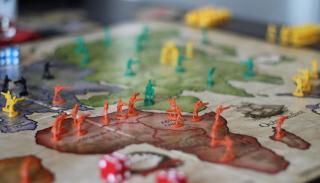
Breadcrumbs navigation
Children’s games and global politics: Masculinity, militarism, and the warrior hero
In this short video extract, Lee Jarvis discusses the key arguments from his new Review of International Studies article - Children’s games and global politics: Masculinity, militarism, and the warrior hero
Want to know more? You can read the full article at DOI: https://doi.org/10.1017/S0260210524000792
BISA members receive access to RIS (and to our other journal European Journal of International Security) as a benefit of membership. To gain access, log in to your BISA account and scroll down to the 'Membership benefits' section. If you're not yet a member join today.
Abstract
Recent years have witnessed growing attention to popular culture’s role in the reproduction, negotiation, and contestation of global political life. This article extends this work by focusing on games targeted at young children as a neglected, yet rich site in which global politics is constituted. Drawing specifically on the Heroes of History card game in the Top Trumps franchise, I offer three original contributions. First, I demonstrate how children’s games contribute to the everyday (re)production of international relations through the contingent storying of global politics. Heroes of History’s narrative, visual organisation, and gameplay mechanics, I argue, construct world politics as an unchanging realm of conflict through their shared reproduction of a valorised, masculinised figure of the warrior hero. This construction, moreover, does important political work in insulating young players from the realities and generative structures of violence. Second, the polysemy of children’s games means they also provide opportunity for counter-hegemonic ‘readings’ of the world even in seemingly straightforward examples of the genre such as this. Third, engaging with such games as meaningful objects of analysis opens important new space for dialogue across International Relations literatures on children, popular culture, gender, the everyday, and heroism in world politics.
Photo by Dave Photoz on Unsplash


